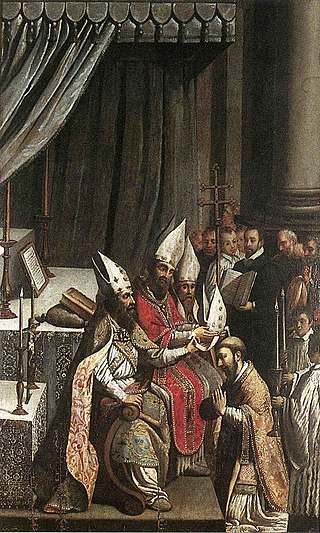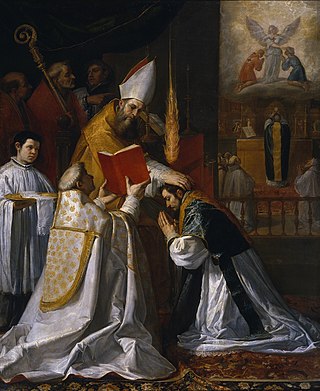
The Society of Catholic Priests (SCP) is a religious society of clergy in the Anglican Communion which draws its membership from Anglicans who consider themselves a part of the liberal Anglo-Catholic tradition.

The Society of Catholic Priests (SCP) is a religious society of clergy in the Anglican Communion which draws its membership from Anglicans who consider themselves a part of the liberal Anglo-Catholic tradition.
The society was founded in 1994 by a group of priests from the Diocese of Southwark who felt that they could no longer remain within the existing fraternal organisations for Anglo-Catholic priests, such as the Society of the Holy Cross, which had taken conservative positions on the ordination of women to the priesthood. Its objective is to promote the formation and support of priestly spirituality and Catholic evangelism. The Archbishop of Canterbury, Justin Welby, is the group's current patron.
In 2009, a group of priests and seminarians from the Episcopal Church and the Anglican Church of Canada gathered at Christ Church, New Haven, Connecticut, to form a North American province of the society, known as the Society of Catholic Priests in the Episcopal Church and the Anglican Church of Canada (often abbreviated SCP NA). [1] An Australian province was also created in 2009.
Membership in the SCP UK is open to all Anglican priests who accept the Anglican Communion as part of the "one, holy, catholic, and apostolic church", who recognise the ordination of women priests, believe in the real presence and who uphold the traditional view of the seven sacraments. Priests keep a rule of life which includes the daily offices of Mattins and Evensong, Eucharistic-centred spirituality, use of a spiritual director, the sacrament of confession and praying for and ministering to other SCP members. Deacons may become associate members. The Society of Catholic Priests is associated with the Dearmer Society, for ordinands who aspire to full membership of SCP, and the Company of Servers, for lay people who serve at the altar.
In the SCP NA, membership is open to all Anglican clergy who; A) believe that the churches of the Anglican Communion are part of the one holy and catholic and apostolic church; B) are members of The Episcopal Church or the Anglican Church of Canada; C) embrace as colleagues all those admitted to holy orders in the same; D) believe in the real presence of Christ in the Eucharist; E) embrace the sacramental life of the Church as means of God's grace; F) and keep the rule of life of the society. In the SCP NA, professed but unordained members of religious communities may also be admitted as full members. Seminarians and seminary graduates preparing for ordination may be admitted as "provisional members", becoming full members automatically upon their diaconal ordination. [2]
Members of the society are entitled to use the letters SCP after their names.
Anglicanism is a Western Christian tradition which developed from the practices, liturgy, and identity of the Church of England following the English Reformation, in the context of the Protestant Reformation in Europe. It is one of the largest branches of Christianity, with around 110 million adherents worldwide as of 2001.

Apostolic succession is the method whereby the ministry of the Christian Church is considered by some Christian denominations to be derived from the apostles by a continuous succession, which has usually been associated with a claim that the succession is through a series of bishops. Those of the Catholic, Eastern Orthodox, Anglican, Church of Sweden, Oriental Orthodox, Church of the East, Hussite, Moravian and Old Catholic traditions maintain that "a bishop cannot have regular or valid orders unless he has been consecrated in this apostolic succession". These traditions do not always consider the episcopal consecrations of all of the other traditions as valid.

In certain Christian denominations, holy orders are the ordained ministries of bishop, priest (presbyter), and deacon, and the sacrament or rite by which candidates are ordained to those orders. Churches recognizing these orders include the Catholic Church, the Eastern Orthodox, Oriental Orthodox, Anglican, Assyrian, Old Catholic, Independent Catholic and some Lutheran churches. Except for Lutherans and some Anglicans, these churches regard ordination as a sacrament.

Anglo-Catholicism comprises beliefs and practices that emphasise the catholic heritage and identity of the various Anglican churches.
Full communion is a communion or relationship of full agreement among different Christian denominations or Christian individuals that share certain essential principles of Christian theology. Views vary among denominations on exactly what constitutes full communion, but typically when two or more denominations are in full communion it enables services and celebrations, such as the Eucharist, to be shared among congregants or clergy of any of them with the full approval of each.

In Christian denominations that practice infant baptism, confirmation is seen as the sealing of the covenant created in baptism. Those being confirmed are known as confirmands. For adults, it is an affirmation of belief. It involves laying on of hands.

In Christianity, a minister is a person authorised by a church or other religious organization to perform functions such as teaching of beliefs; leading services such as weddings, baptisms or funerals; or otherwise providing spiritual guidance to the community. The term is taken from Latin minister. In some church traditions the term is usually used for people who have been ordained, but in other traditions it can also be used for non-ordained.
Forward in Faith (FiF) is an organisation operating in the Church of England and the Scottish Episcopal Church. It represents a traditionalist strand of Anglo-Catholicism and is characterised by its opposition to the ordination of women to the priesthood and episcopate. It also takes a traditionalist line on other matters of doctrine. Credo Cymru is its counterpart in Wales. Forward in Faith North America (FIFNA) operates in the U.S.
Apostolicae curae is the title of an apostolic letter, issued in 1896 by Pope Leo XIII, declaring all Anglican ordinations to be "absolutely null and utterly void". The Anglican Communion made no official reply, but the archbishops of Canterbury and York of the Church of England published a response known by its Latin title Saepius officio in 1897.
In keeping with its prevailing self-identity as a via media or "middle path" of Western Christianity, Anglican sacramental theology expresses elements in keeping with its status as a church in the catholic tradition and a church of the Reformation. With respect to sacramental theology the Catholic tradition is perhaps most strongly asserted in the importance Anglicanism places on the sacraments as a means of grace, sanctification and forgiveness as expressed in the church's liturgy.

The sacrament of holy orders in the Catholic Church includes three orders: bishops, priests, and deacons, in decreasing order of rank, collectively comprising the clergy. In the phrase "holy orders", the word "holy" means "set apart for a sacred purpose". The word "order" designates an established civil body or corporation with a hierarchy, and ordination means legal incorporation into an order. In context, therefore, a group with a hierarchical structure that is set apart for ministry in the Church.

The Anglican ministry is both the leadership and agency of Christian service in the Anglican Communion. Ministry commonly refers to the office of ordained clergy: the threefold order of bishops, priests and deacons. More accurately, Anglican ministry includes many laypeople who devote themselves to the ministry of the church, either individually or in lower/assisting offices such as lector, acolyte, sub-deacon, Eucharistic minister, cantor, musicians, parish secretary or assistant, warden, vestry member, etc. Ultimately, all baptized members of the church are considered to partake in the ministry of the Body of Christ.
The September 14–16, 1977 Congress of St. Louis was an international gathering of nearly 2,000 Anglicans in St. Louis, Missouri, united in their rejection of theological changes introduced by the Anglican Church of Canada and by the Episcopal Church in the United States of America in its General Convention of 1976. Anglicans who attended this congress felt that these changes amounted to foundational alterations in the American and Canadian provinces of the Anglican Communion and meant that they had "departed from Christ's One, Holy, Catholic and Apostolic Church." Theological liberalism, revisions to the Book of Common Prayer, and the ordination of women priests were not the only reasons for the split, but they were seen by these churches as evidence of the mainline church's departure from Anglican orthodoxy. The idea for a congress originated with the Reverend Canon Albert J. duBois in 1973 in preparation for the Louisville General Convention of the Episcopal Church. This congress was sponsored by the Fellowship of Concerned Churchmen, an organization founded in 1973 as a coordinating agent for laypeople and clergy concerned about the breakdown of faith and order within the Episcopal Church and the Anglican Church of Canada.
The Convergence Movement, also known as the Ancient-Future Faith, whose foundation is primarily attributed to Robert E. Webber in 1985, is an ecumenical movement. Developed as an effort among evangelical, charismatic and Pentecostal, and liturgical Christians and denominations blending their forms of worship, the movement has been defined for its predominant use of the Anglican tradition's Book of Common Prayer; use from additional liturgical sources common to Lutheranism, Eastern Orthodoxy, and Catholicism have also been employed.

In Christianity, concelebration is the presiding of a number of presbyters at the celebration of the Eucharist with either a presbyter, bishop, or archbishop as the principal celebrant and the other presbyters and (arch)bishops present in the chancel assisting in the consecration of the Eucharist. The concelebrants assist the principal celebrant by reciting the Words of Consecration together with them, thus effecting the change of the eucharistic elements. They may also recite portions of the Eucharistic Prayer.

The priesthood is the office of the ministers of religion, who have been commissioned ("ordained") with the Holy orders of the Catholic Church. Technically, bishops are a priestly order as well; however, in layman's terms priest refers only to presbyters and pastors. The church's doctrine also sometimes refers to all baptised (lay) members as the "common priesthood", which can be confused with the ministerial priesthood of the consecrated clergy.

Anglican interest in ecumenical dialogue can be traced back to the time of the Reformation and dialogues with both Orthodox and Lutheran churches in the sixteenth century. In the nineteenth century, with the rise of the Oxford Movement, there arose greater concern for reunion of the churches of "Catholic confession". This desire to work towards full communion with other denominations led to the development of the Chicago-Lambeth Quadrilateral, approved by the Third Lambeth Conference of 1888. The four points were stipulated as the basis for church unity, "a basis on which approach may be by God's blessing made towards Home Reunion":

The Episcopal Church (TEC), based in the United States with additional dioceses elsewhere, is a member church of the worldwide Anglican Communion. It is a mainline Protestant denomination and is divided into nine provinces. The presiding bishop of the Episcopal Church is Michael Bruce Curry, the first African American bishop to serve in that position.
A personal ordinariate for former Anglicans, shortened as personal ordinariate or Anglican ordinariate, is a canonical structure within the Catholic Church established in order to enable "groups of Anglicans" and Methodists to join the Catholic Church while preserving elements of their liturgical and spiritual patrimony.
This is a glossary of terms used within the Catholic Church. Some terms used in everyday English have a different meaning in the context of the Catholic faith, including brother, confession, confirmation, exemption, faithful, father, ordinary, religious, sister, venerable, and vow.